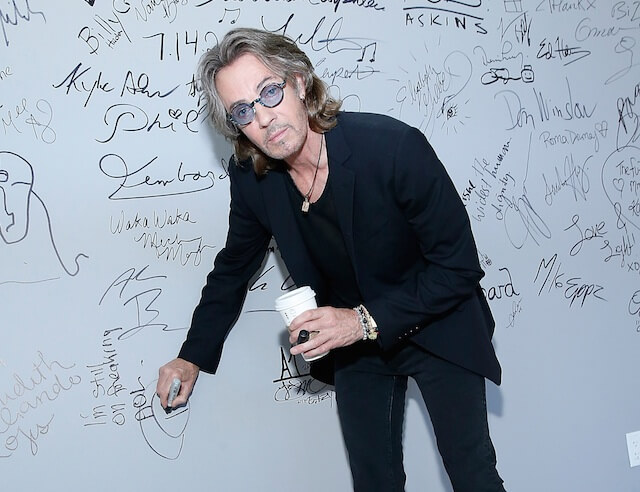Rick Springfield had just rang the closing bell at the New York Stock Exchange when our phonecall begins. “I stopped major companies from trading,” he says chuckling at the craziness of it all. Talking to him it’s clear he’s not the kind of guy who puts an end to corporate trading. He’s modest and self-effacing, friendly and willing to talk openly and honestly about anything, including what has been a pretty bizarre career. For instance, when Springfield had his biggest song — the number one hit and Grammy winner “Jessie’s Girl” — he was in the middle of a two-year stint on “General Hospital.” He also wrote an acclaimed memoir, plus, last year, a bestselling novel, “Magnificent Vibration.” Right now he’s in “Ricki and the Flash,” starring opposite no less than Meryl Streep in a film by Jonathan Demme. He plays Greg, part of an aging, small-time covers band fronted by Streep’s Ricki. Demme, he tells us, “wanted someone to sell the fact that this guy is supposed to be a really good guitar player who never made it. There’s a scene that was actually cut about Greg being on the cover of a guitar magazine in the ’80s — a shredder magazine. He settled into the fact that he had his shot, but he’s happy to still be playing his guitar.” RELATED: “Ricki and the Flash” stars Meryl Streep as a rock god who never made it Springfield himself still plays big concerts, and his 18th album is due at year’s end. But he really liked the portrayal of those who hadn’t had his luck. “There’s a sadness to that, but it’s also kind of cool. There’s a lot of damaged people in that story,” he says. “It’s what I loved about the movie.” They did play live, this being a Jonathan Demme movie, he of “Stop Making Sense,” “Storefront Hitchcock” (about Robyn) and three Neil Young concert movies (so far). “He knows what live music feels like. Since we were a cover band it would have looked odd if it was lip-synched to perfect tracks, like most music in films. He wanted it rough and ready and real, and that’s what we played.” Streep herself learned how to play rhythm guitar in the months leading up to the shoot. Springfield got to actually see the Oscar-winner nervous. “Which was very encouraging and heartening for me, who was nervous to be in a movie with Meryl Streep,” he says. “Ricki and the Flash” arrives almost concurrently with Springfield’s stint as a shady psychiatrist on “True Detective.” He hasn’t seen it. “I generally don’t like to see stuff that I’ve done,” he admits. “A lot of my friends emailed me and said, ‘Dude, you creeped me out so bad.’” Of course, Springfield is a seasoned actor, even if the role that first made him famous didn’t come easily. “Soap opera acting is incredibly difficult for me,” he confesses. “It became all about line memorization. You just don’t have the time to work on the character. You have so much dialogue. It’s nothing to do with acting. It’s just like picking up a hammer to build a house. It’s just something you have to do. There are a lot of actors on soaps who are incredible it. I always found it very difficult.” Back when he was on top, his head even got so big he famously turned down a role in the 1983 space race epic “The Right Stuff.” “That was the one time in my career I let my ego get the better of me,” he says. Indeed, he was mostly self-effacing even then. In the 1981 song “Bruce,” he sings about a woman who went to bed with him, confusing him with Bruce Springsteen. “I wrote that as a kind of joke in the ’70s, because that had happened to me,” he remembers. “When I started having some record success the people that owned the record brought it out as a single.” As it happens, a key scene in “Ricki and the Flash” features the band playing The Boss’ “My Love Will Not Let You Down.” “That was Meryl. They asked which songs we should do in the production, and Meryl brought that one out. It’s a pretty deep Springsteen cut. I’d never heard it before,” he says. Neither had this writer, not being a Bruce completist. “Me either,” he replies. One thing he’s definitely not modest about is the fact that he wrote his memoir, 2011’s “Late, Late at Night,” without a ghost writer — almost unheard of in the annals of rock god books. “We were in talks and I had already written about 30,000 words,” he tells us. “They lined me up with a ghost writer and she wrote a test chapter. I read it and it was good, but it could have been about any musician. So I called up my publisher and said, ‘I have 30,000 words here.’ And she loved it. She said, ‘You’re writing the whole thing.’” Incidentally, Springfield speaks with an American accent, but he’s in fact an Australian, which you can occasionally half-detect in his pronunciations. “I went to a voice coach in 1975 to pick up an authentic American accent,” he explains. “Back then no one really knew about Australia. They’d ask me questions like, ‘How long did it take you to learn English?’ Ignorant stuff like that. I figured I’d never be up for an Australian part, so I better get the accent down because I’m going to be competing with other Americans.”
Rick Springfield on ‘Ricki and the Flash,’ Meryl Streep and losing his Australian accent

Getty Images
Follow Matt Prigge on Twitter @mattprigge























